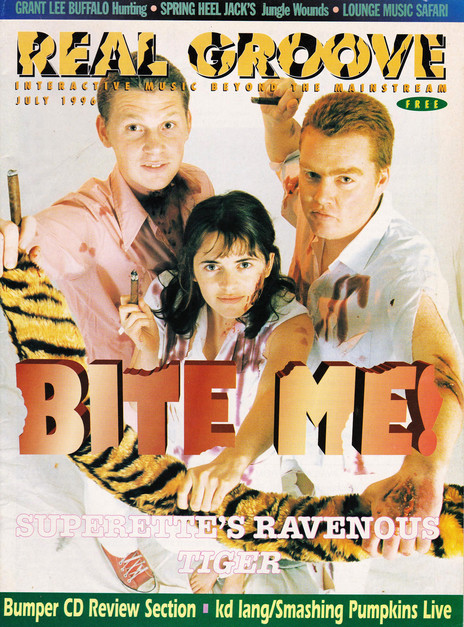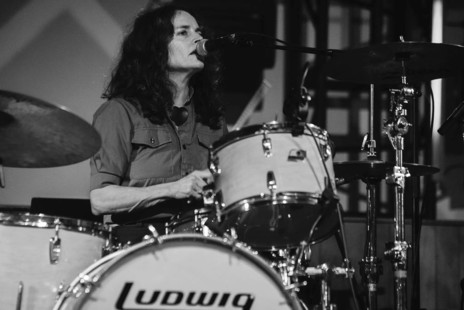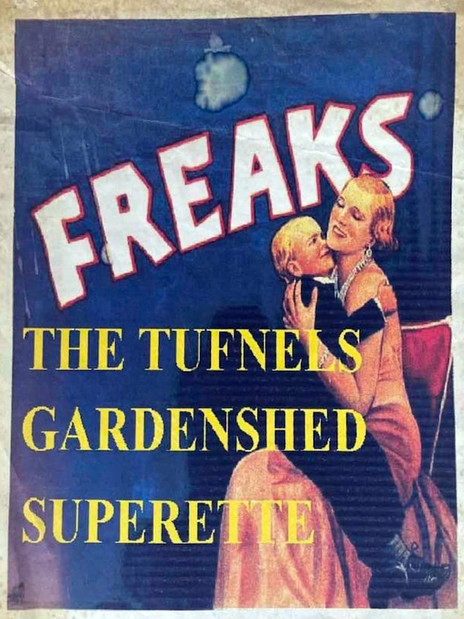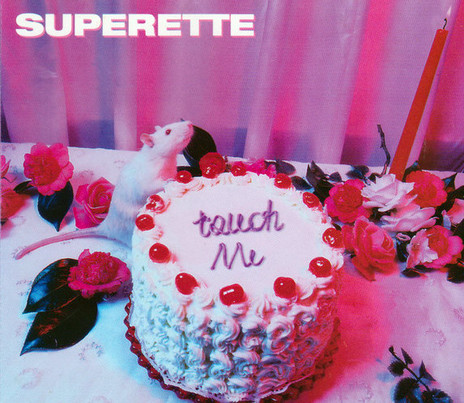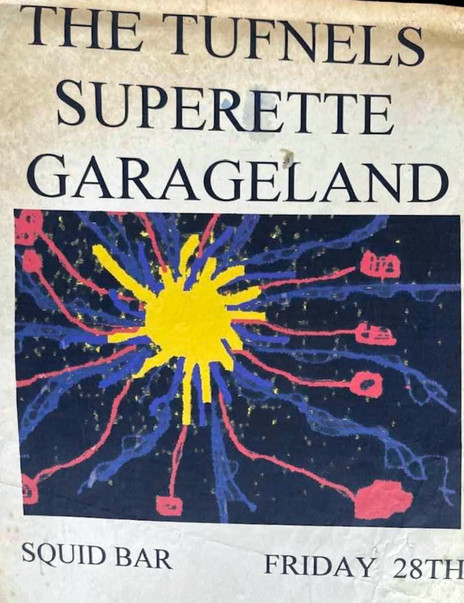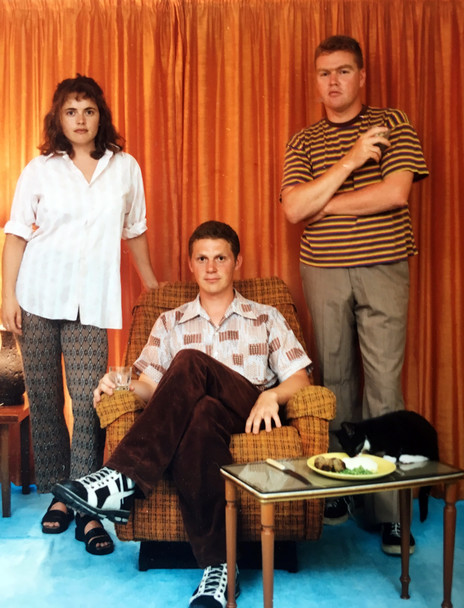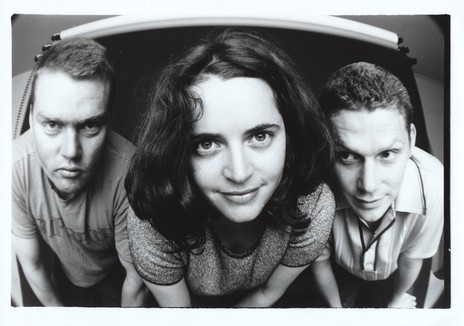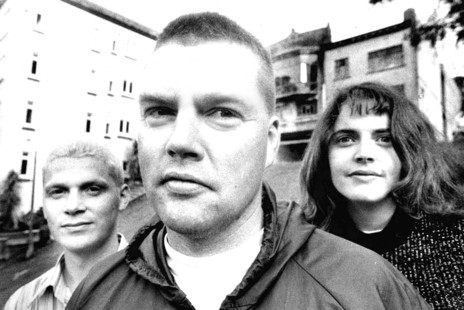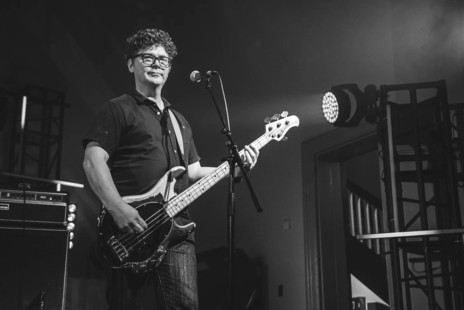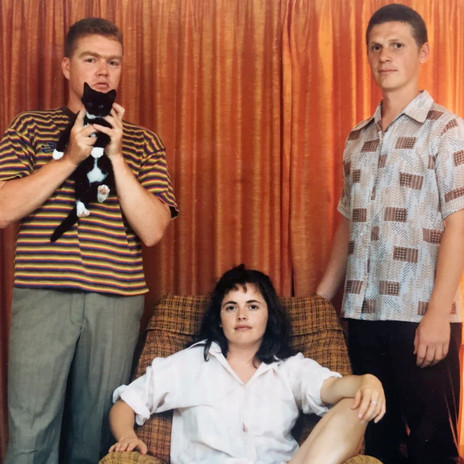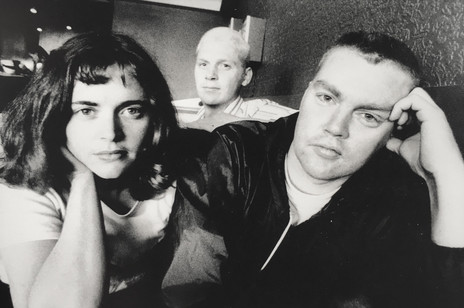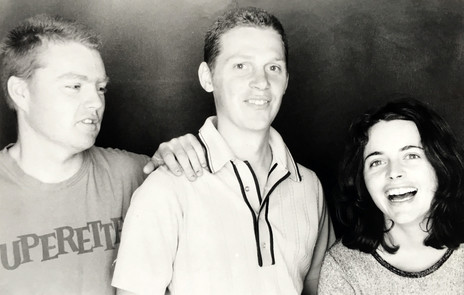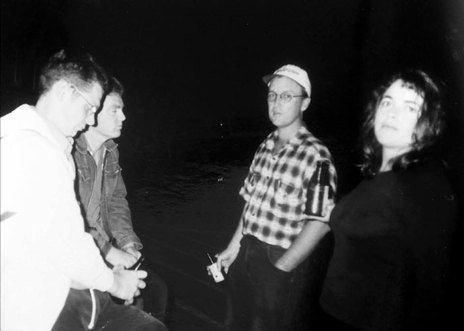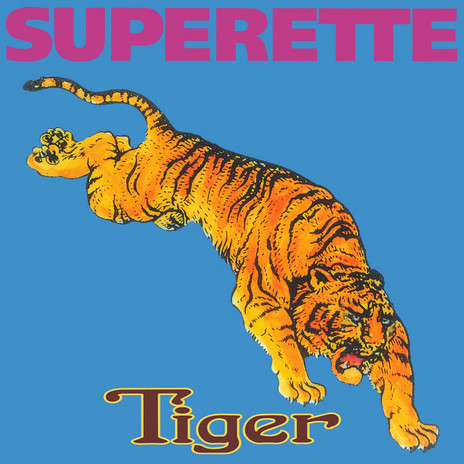JPSE gained a more cohesive indie-pop sound on the album Size of Food (1990), though always with dissonant guitar notes and busy drum beats, especially on Mulcahy contributions such as ‘Slip’ and ‘Inside & Out’. Their in-between albums single ‘Precious’ showed the band moving towards a more accessible sound, even while the vocals were often kept low in the mix under shoe-gazey guitars.
Dave Mulcahy was one of three songwriters in the group and found his contributions being squeezed out, with Dave Yetton taking most of the songwriting and guiding the group’s sound. Flying Nun was partly owned by Mushroom Records by this stage and there was a growing sense that JPSE needed to ride the popular wave of alternative rock that was rising at the time.
As they moved into recording their next album, Bleeding Star, Mulcahy found he differed from the others in the band on how they should move forward.
“I think towards the end, JPS tried to be a band that could be marketed, and I don’t think it worked,” he explained to Sunday Star Times a few years later. “It was 90% boredom and 10% fun. Looking back, I’d say you should always trust your instincts and not worry about success.”
Even before Mulcahy had left JPSE, he performed a couple of gigs with his girlfriend Greta Anderson and their mutual friend Ben Howe under the name Monster. Anderson and Howe had attended Metropolitan College together, where they received lessons from Don McGlashan. Anderson had then been a member of all-female group, The Blue Marbles, who were regulars on the Auckland scene. When the group needed a bass player at short notice, Anderson brought in Howe, which led to one of his early shows being at an all-female music festival.
Monster had just begun to morph into Superette, when Anderson headed overseas
Monster had just begun to morph into Superette, when Anderson headed overseas in 1993. “Superette had already recorded some demos including ‘Slide’ before I left for New York. I played in a band with NYC people called The Product Group. I was there for about a year and Dave came at the end with JPSE’s Noisyland tour. I went along on the tour as a groupie. Then Dave and I went back to New York briefly, then returned to Aotearoa and continued to write songs in the George Court building.”
Mulcahy was keen for Superette to be a collaborative endeavour, in which songs were worked into their final form in the practice room and each member could bring song ideas. He also downplayed expectations with the band name, jokingly following the trend of bands with “super” in their name (Supergroove, Superchunk, and Supergrass), but instead adopting the parochial term for a convenience store, Superette. For a short while, the line-up included “Big Ross” Williams (Bird Nest Roys, The Tufnels), though the band soon settled into being a stripped-back three-piece and they undertook the hard graft of launching themselves with regular gigging around Auckland.
‘Killer Clown’ was a perfect entrée single, with the slightly unsettling guitar riff and sliding bass part given forward momentum by the drums. The band then fell in synch for the melodic chorus, though this was when the topic of the song was made clear by the lyrics (“of the 33 dead, I only touched one”). The inspiration was the serial killer John Wayne Gacy, who had a part-time job as a clown and the final verse describes his death by lethal injection.
The B-side of the 7" was ‘Disappear’ which showed the trio could also make big, fuzzy guitar pop. The cover was a photo of Anderson’s dog, and this image was also used for their five-song EP, Rosepig (1995) named after the pooch.
From the start, Superette had two key collaborators. The music video for ‘Killer Clown’ was directed by Stuart Page and showed a children’s party held for adults, with the cake crammed into attendees’ faces and participants passing out. They recorded these early songs and their subsequent album with Nick Roughan (Skeptics) at Auckland’s York Street Recording Studios (then located on Auckland’s Shortland Street). Mulcahy had worked with Roughan previously on JPSE’s Size of Food album, and was actively engaged as a producer, helping them mould the structure of their songs and elevating their overall sound.
Flying Nun was excited by what they were hearing and got behind the group – adding anger-fuelled track ‘Slide’ to the compilation, The Sound Is Out There (1995) and getting them to record ‘Knowing Me, Knowing You’ for the Abbasolutely ABBA covers album.
Superette’s 1996 debut album Tiger made good on their early promise, with a variety of songs that showed the depth of their combined talents. Anderson provided the core idea and the lyrics for ‘Saskatchewan’, which had the group sounding more powerful and heavy than ever before. She also worked with Howe to write ‘I Got It Clean,’ while he contributed the sweet-hearted break-up song ‘Bye Bye’ and added guitar parts throughout the album.
Mulcahy also had the opportunity to show new sides to his own songwriting. The final track ‘Waves’ was a murder ballad that he wrote and recorded alone in his bedroom using a four-track borrowed from Voom’s Buzz Moller. Then there were the album’s two big singles – the catchy student radio hit ‘Touch Me’ and the grunge-era pop of ‘Kiss Someone’.
the inspiration for ‘Touch Me’s lyrics was John Lennon’s killer, Mark David Chapman
Mulcahy saw ‘Touch Me’ as a throwaway number, though it certainly was effective – his vocals playing off Anderson’s in the chorus to create an undeniable hook. It seemed like a straight-forward love song, but things were never that simple in the world of Superette – the inspiration for the lyrics was John Lennon’s killer, Mark David Chapman.
Stuart Page returned to make the music video, which undercut the sweetness further by having the band performing at a peep show within Auckland’s red light district around K Rd. Page followed this with a video for ‘Kiss Someone’ that had Mulcahy dressed as a tiger and chased around the jungle (actually the bush around Piha) by hunters played by Ben Howe and Greta Anderson. Their guide was Simon Cuming, who’d also starred in their previous videos. His Indian garb might seem culturally insensitive to modern eyes, but it ended with a twist – the hunting party turning on Howe and putting him in the cooking pot rather than the tiger.
These videos were given ample airplay on music television (particularly on Max TV) and the band received another boost of attention when ‘Saskatchewan’ and ‘Waves’ appeared on the soundtrack of Harry Sinclair’s Topless Women Talk About Their Lives (1997), which was a top seller for Flying Nun. Superette toured hard on the back of the album, including two appearances at the Big Day Out and a fun support slot with Pavement (Mulcahy enjoyed playing Scrabble with them).
However, the band increasingly found obstacles in their way. Anderson and Mulcahy had broken up as romantic partners and despite their best intentions of keeping the band going, the situation was never going to be easy.
The bigger problem was that Mushroom Records had become harder to please since taking over 100% ownership of Flying Nun in 1997. Lesley Paris was the manager of Flying Nun at the time and was a huge fan of Superette. She wanted to fund a second album but found herself being rebuffed by the head office in Australia (which she later cited as one reason why she subsequently quit the label). Superette had already begun demoing a half-dozen new songs and had plans to relocate to the UK. However, this wasn’t realistic without the backing of Mushroom. Superette were finished.
Mulcahy launched a solo career with the release of Oddy Knocky (1998). The album was recorded with Ed Case, who’d recorded Superette for the ABBA compilation and it was released through a new label that Case had started with Howe, Arch Hill Recordings (named after the location of Case’s studio). Meanwhile, Howe and Anderson had started a duo as Ben and Greta, with their song ‘Creep Around The House’ appearing on the first compilation by Arch Hill.
Howe would go on to front a pair of subsequent bands, Black Swan White Swan and Fang, alongside his long-term partner, Sonya Waters. Anderson moved into photography, notably creating one exhibition The Transcenders in which each image showed an item related to a female musician, all of whom were known for playing instruments rather than singing – for example, Jane Walker (Toy Love), Kaye Woodward (The Bats), Jane Dodd (Able Tasmans, The Verlaines), and Rachael King (Cake Kitchen). She eventually moved back to music as singer-guitarist in Half-Sister with her partner Gary Sullivan (JPSE, Solid Gold Hell, Dimmer) taking the drum seat and the pair joined by Hermione Johnston on keyboards.
Mulcahy moved back to Christchurch in 2000, where he continued to write, record, and perform in bands. He formed Eskimo/Kimo with Failsafe Records owner Rob Mayes on bass (Throw, Springloader, and Dolphin) and drummer Michael Daly (Renderers, Leadleg and YFC). Other members also came and went, such as singer Namiko Iwamoto and guitarist Mark Roberts (Enright House). Meanwhile, Mulcahy also had a second band, Spider, based in Auckland.
Superette occasionally reformed for shows, such as Flying Nun’s 40th birthday event in 2022
Superette occasionally reformed for shows, taking part in a Flying Nun show in 2003 and performing at The Kings Arms in 2008. Eventually Ben Howe brought his experience as a record label to bear when he became a co-owner and director of Flying Nun Records. He arranged the re-pressing of many of their key acts from the 1990s, though initially held off on a Superette re-pressing so as not to be accused of favouritism. Tiger received a proper reissue in 2018, which included six demos that had been recorded for their never-completed second album.
The band members were spread throughout the country by this stage with Howe in Wellington, Anderson in Auckland, and Mulcahy in Christchurch. Mulcahy continued to release music over this time, playing with drummer Mark White (Into The Void) in Sexy Animals, before the pair became the core of Medal, along with John Billows (ex-Renderers, who’d previously played with Mulcahy in The Cranks and Mulcahy in his band, The Glass Eye). Mulcahy also took a dip into the past by touring a “Songs of Dave Mulcahy” show in 2015.
The new version of Tiger was promoted by previously unreleased song ‘Pretty Picture’ which sounded as fresh and vibrant as when it had been recorded more than two decades earlier. Both old and new fans flocked to see the trio perform at the Other’s Way Festival in Auckland in 2018 and Flying Nun’s 40th birthday event at the Auckland Town Hall in 2022. There was a clear sense of how powerful the band had been at their height and any regrets about what could have been were outweighed by the joy of seeing the audience singing along with every word.
